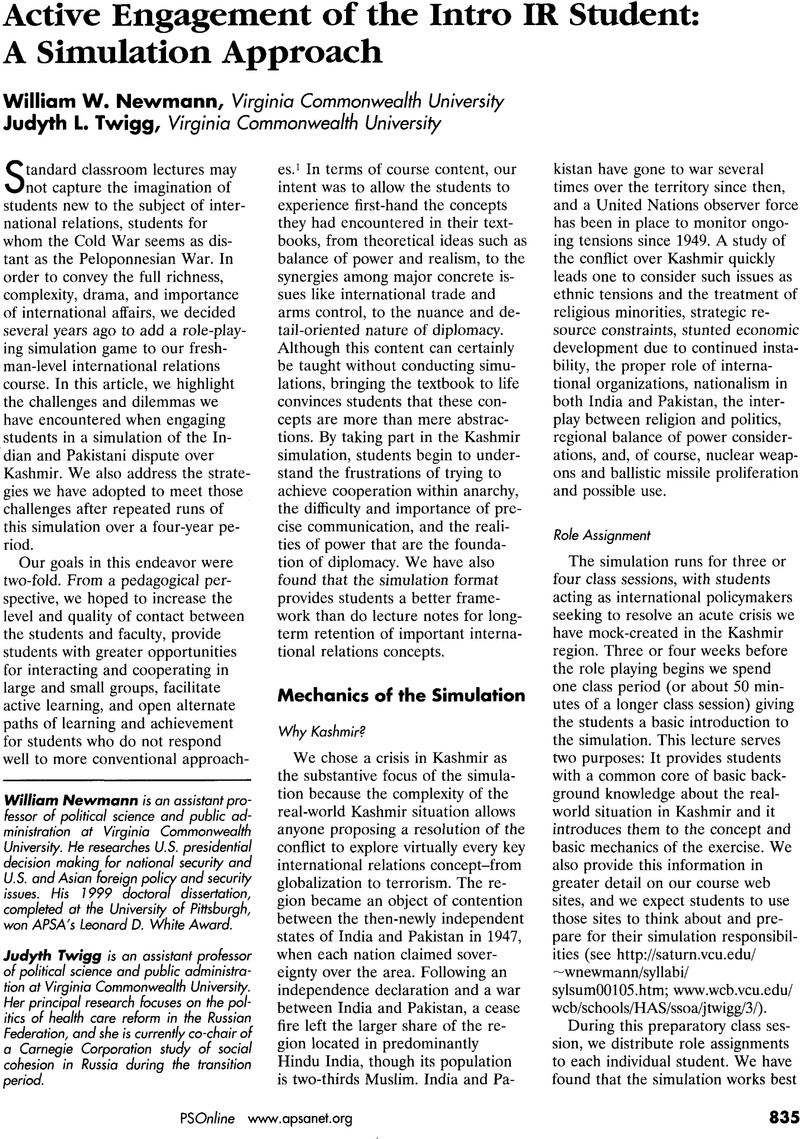Crossref Citations
This article has been cited by the following publications. This list is generated based on data provided by Crossref.
Frederking, Brian
2005.
Simulations and Student Learning.
Journal of Political Science Education,
Vol. 1,
Issue. 3,
p.
385.
Thies, Cameron G.
2005.
How to Make the Most of Your Summer Study Abroad Teaching Experience.
PS: Political Science & Politics,
Vol. 38,
Issue. 1,
p.
83.
THIES, CAMERON G.
2005.
A Crash Course in Learning Communities for the Political Scientist.
Journal of Political Science Education,
Vol. 1,
Issue. 1,
p.
129.
Stover, William James
2005.
Teaching and Learning Empathy: An Interactive, Online Diplomatic Simulation of Middle East Conflict.
Journal of Political Science Education,
Vol. 1,
Issue. 2,
p.
207.
Baranowski, Michael
2006.
Single Session Simulations: The Effectiveness of Short Congressional Simulations in Introductory American Government Classes.
Journal of Political Science Education,
Vol. 2,
Issue. 1,
p.
33.
Shellman, Stephen M.
and
Turan, Kürşad
2006.
Do Simulations Enhance Student Learning? An Empirical Evaluation of an IR Simulation.
Journal of Political Science Education,
Vol. 2,
Issue. 1,
p.
19.
KRAIN, MATTHEW
and
LANTIS, JEFFREY S.
2006.
Building Knowledge? Evaluating the Effectiveness of the Global Problems Summit Simulation.
International Studies Perspectives,
Vol. 7,
Issue. 4,
p.
395.
Mendeloff, David
and
Shaw, Carolyn
2009.
Connecting Students Internationally to Explore Postconflict Peacebuilding: An American–Canadian Collaboration.
Journal of Political Science Education,
Vol. 5,
Issue. 1,
p.
27.
Baranowski, Michael
and
Weir, Kimberly
2010.
Power and Politics in the Classroom: The Effect of Student Roles in Simulations.
Journal of Political Science Education,
Vol. 6,
Issue. 3,
p.
217.
Hai-Jew, Shalin
2011.
Gaming and Simulations.
p.
1847.
Prinsen, Gerard
and
Overton, John
2011.
Policy, Personalities and Pedagogy: The Use of Simulation Games to Teach and Learn about Development Policy.
Journal of Geography in Higher Education,
Vol. 35,
Issue. 2,
p.
281.
Kachuyevski, Angela
and
Jones, Sandra F.
2011.
Bringing Theory to Life Through Field Study.
International Studies Perspectives,
Vol. 12,
Issue. 4,
p.
447.
Glazier, Rebecca A.
2011.
Running Simulations without Ruining Your Life: Simple Ways to Incorporate Active Learning into Your Teaching.
Journal of Political Science Education,
Vol. 7,
Issue. 4,
p.
375.
Sauvé, Louise
Renaud, Lise
and
Kaufman, David
2011.
Gaming and Simulations.
p.
168.
Fischler, Lisa
2012.
Encountering China: Contexts and Methods for Teaching Chinese Politics in American Classrooms.
Journal of Chinese Political Science,
Vol. 17,
Issue. 4,
p.
361.
Obendorf, Simon
and
Randerson, Claire
2012.
The Model United Nations simulation and the student as producer agenda.
Enhancing Learning in the Social Sciences,
Vol. 4,
Issue. 3,
p.
1.
Roberts, Joseph W.
2013.
Designing a New Simulation of Ethnic Conflict: Lessons Learned from the Trenches.
SSRN Electronic Journal,
Forster Rothbart, Amy
2013.
All the Classroom's a Stage: Student Temperament and the Effectiveness of Role Playing Simulations.
SSRN Electronic Journal,
Frombgen, Elizabeth
Babalola, David
Beye, Aaron
Boyce, Stacey
Flint, Toby
Mancini, Lucia
and
Van Eaton, Katie
2013.
Giving Up Control in the Classroom: Having Students Create and Carry Out Simulations in IR Courses.
PS: Political Science & Politics,
Vol. 46,
Issue. 02,
p.
395.
Mariani, Mack
and
Glenn, Brian J.
2014.
Simulations Build Efficacy: Empirical Results from a Four-Week Congressional Simulation.
Journal of Political Science Education,
Vol. 10,
Issue. 3,
p.
284.



